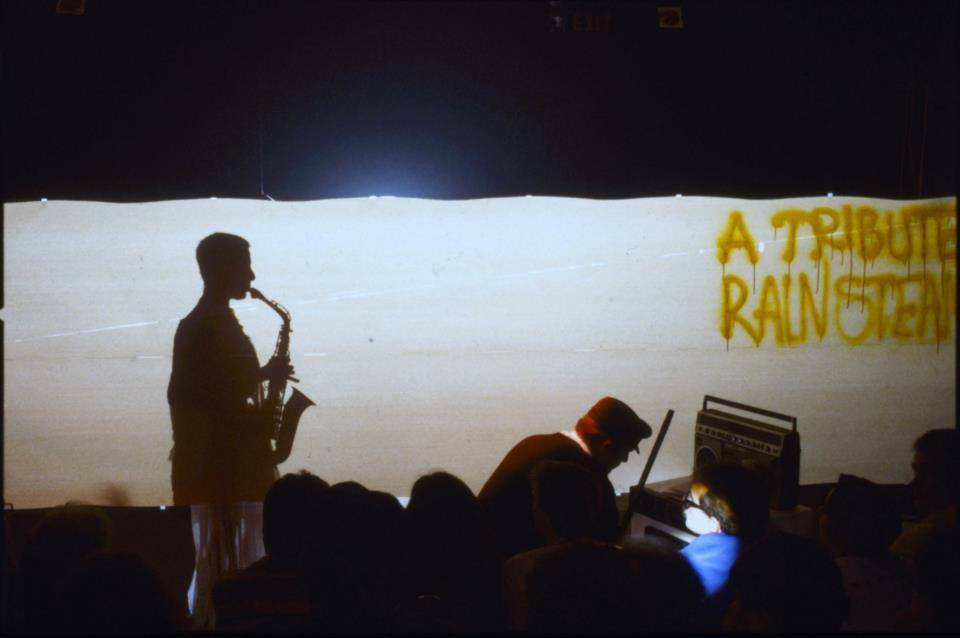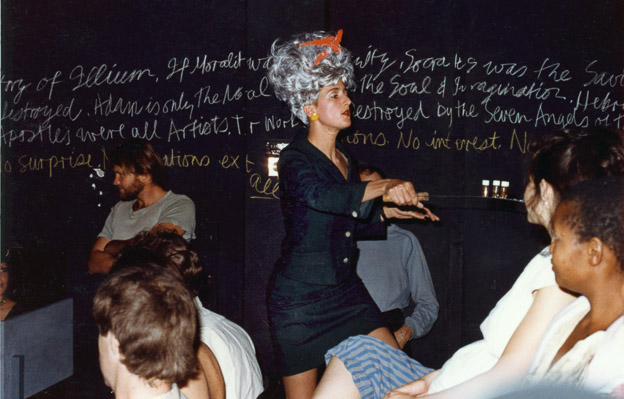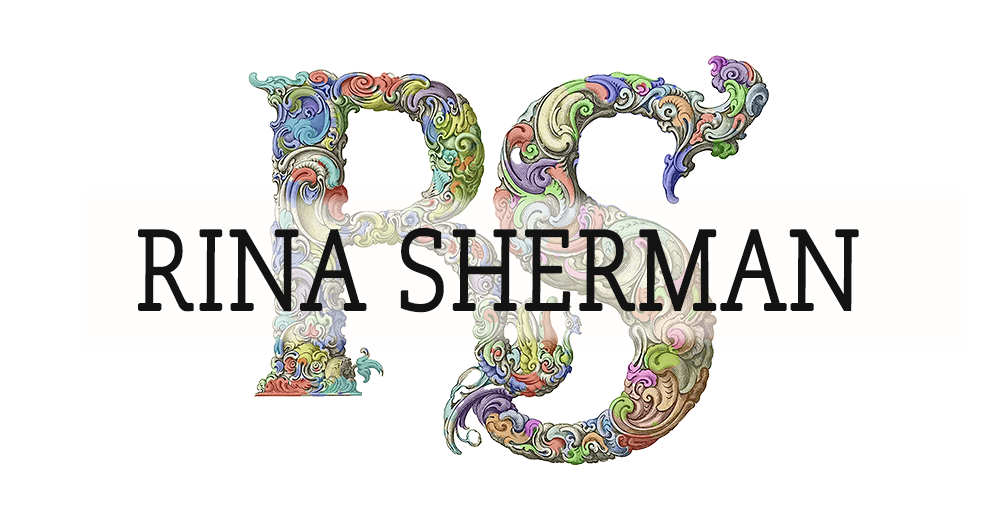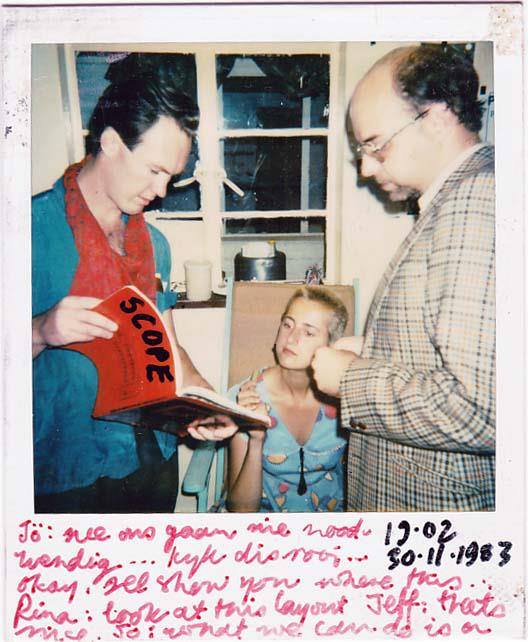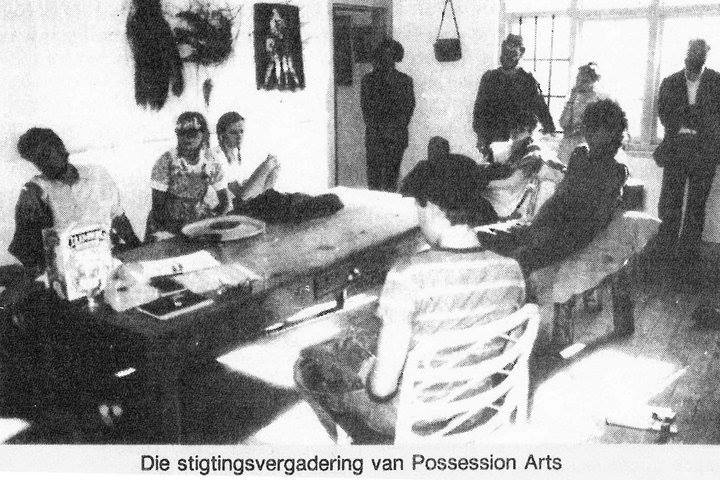J’ai officiellement mis fin à mon fétichisme des poulets le jour où une femme du sud de la France m’a appelée en me demandant : « Vous êtes la femme aux poulets ? » Cela marque la publication d’un livre 30 ans après « Schreber’s Chicken », une performance au Market Theatre que Wilhelm Hahn, le défunt, et moi avons réalisée avec Possession Arts, le groupe de performance art que nous avons cofondé en 1982, avec John Nankin comme moteur principal du mouvement (qui gère aussi la page Pos Arts sur Facebook). Dans cette performance, j’ai exploré les humeurs de plusieurs milliers de poulets, telles qu’elles étaient connues dans les cultures sumériennes antiques. Mes parents ont participé—mon père, vêtu de son costume cousu à la main, est resté assis dans le deuxième rang, peut-être en se demandant comment il s’est retrouvé là. Ma mère, anarchiste, a coupé un poulet cru et en a distribué des morceaux au public. Mon poulet de compagnie, Flabelula, était sur scène avec moi, et certains spectateurs sont partis, pensant probablement qu’un sacrifice était imminent. Mais rien de tout cela n’a eu lieu ! Lorsque j’ai pris mon vol, Flabelula a été confiée à Margie, qui travaillait dans notre maison, et a ensuite été remise à ses parents dans un village reculé, où elle a fini dans une marmite en fer à trois pieds sur le feu, une fin inévitable pour une poule avec une histoire.
Voici The Fort à Hillbrow, le site qui nous a été offert, un immense bâtiment inutilisé, chargé d’histoire de l’apartheid, qui a finalement conduit à la destruction de Possession Arts. Il abrite aujourd’hui le complexe de la Cour constitutionnelle. Après que le maire de Johannesburg, le conseiller Gadd, ait décidé que ce serait le site idéal pour notre espace artistique proposé—une idée qui impliquait initialement de trouver une propriété abandonnée du conseil, comme les anciens préfabriqués de Newtown—tout le monde, à l’intérieur et à l’extérieur de Possession Arts, est devenu obsédé par ce projet, ce qui nous a finalement conduits à notre perte.
Il est remarquable que le bureau du maire n’ait pas su—ou ignorait—que de nombreuses personnes impliquées dans Possession Arts étaient liées à la vieille maison du 62 Raleigh Street, qui avait été démolie quelques mois auparavant dans le cadre d’un projet d’amélioration du quartier. Pendant sa campagne électorale l’année précédente dans son quartier de Yeoville, le maire avait promis à ses électeurs que, s’il était réélu, il ferait démolir cette maison, car elle était habitée par des ivrognes, des vagabonds et des éléments hors-la-loi. En vérité, les sans-abri étaient nos voisins, vivant sur le terrain vacant entre le 62 Raleigh Street et la bibliothèque, où ils utilisaient la fontaine pour l’eau courante.
Le nom « Possession » a été inspiré par l’observation des sans-abri vivant à côté de ma chambre au #62. Je les observais chaque matin, Kaptein, l’homme, se rasait dans la fontaine de la bibliothèque et allumait un feu pour cuisiner. Un jour, je suis rentrée chez moi et j’ai trouvé Chas en train de baigner un homme dont la jambe était gangrenée. Malgré leur pauvreté extrême, ces individus étaient, à mon avis, aussi « possédés » que n’importe quel habitant de banlieue par un mythe de la vie urbaine correcte. Dans ce mythe, ils avaient de la propriété et de l’agence—ils avaient créé un mode de vie durable, malgré leur manque d’accès aux services de base comme les soins de santé. Je ne voyais aucune raison pour laquelle nous ne pourrions pas faire de même—nous consacrer à vivre hors du système économique et nous concentrer uniquement sur la création et la présentation de l’art. Le nom « Possession » rendait hommage à leur absence de possessions, à leur Possession d’un mode de vie.
Lorsque la première réunion a été convoquée pour discuter de l’idée d’un espace artistique commun, trois problèmes sont rapidement apparus. Le premier concernait le nom du groupe. Plusieurs des contingents présents avaient des identités bien établies—comme le groupe Weekend Theatre, qui avait transformé un appartement à Braamfontein en un lieu de performances. J’avais utilisé le nom « Possession Theatre » pour décrire ma recherche de lieu, et quelqu’un a suggéré de l’utiliser « temporairement », ce qui a conduit à l’ajout de « arts », pour refléter la nature pluridisciplinaire du groupe.
Ensuite, nous devions élire un comité de direction. Je me suis récusée, car j’avais des idées fermement ancrées sur la façon dont les organisations semblaient souvent servir les intérêts de leurs fondateurs et gestionnaires tout en récoltant des fonds pour des programmes communautaires. Je pensais que je pouvais être plus utile en tant que catalyseur plutôt qu’en tant que personne cherchant à contrôler le groupe. J’ai proposé Ivor Powell comme président. Il était acceptable pour un large éventail de personnes présentes, calme, articulé, universitaire et historien de l’art. Il semblait être le moins susceptible de devenir une figure divisive et aliénante.
Nous avons également discuté de la manière de capter l’attention des propriétaires de bâtiments et des bailleurs de fonds, convaincus qu’ils nous fourniraient ce dont nous avions besoin. Quelqu’un a suggéré de commencer par organiser une nouvelle soirée de performances courtes, dans le style de celles que Joachim, Frank, Jeffrey et moi avions présentées à Wits quelques semaines plus tôt. Cette suggestion a été largement acceptée, et nous nous sommes tous rendus au Mayfair Hotel pour un verre.
Ces concerts de performances courtes sont devenus l’activité principale du groupe. Ils n’étaient jamais destinés à être autre chose que des déclarations d’intention—des esquisses ou des possibilités. Ils étaient très populaires, chaotiques et intéressants, surtout lorsqu’ils étaient vus comme un montage inattendu de travaux différents, conçus de manière isolée mais se rassemblant d’une manière qui semblait intentionnelle. Bien que nous ayons été une alliance lâche et peut-être opportuniste plutôt qu’un mouvement formel, ces performances ont créé un vocabulaire et un langage communs.
Bien que nous ayons tenté de publier un journal, de créer des films et des photo-comics, d’organiser des festivals, de produire des pièces originales et de réaliser des installations collectives, nous n’avons jamais atteint notre objectif ultime : trouver un bâtiment gratuit, un lieu de travail.
